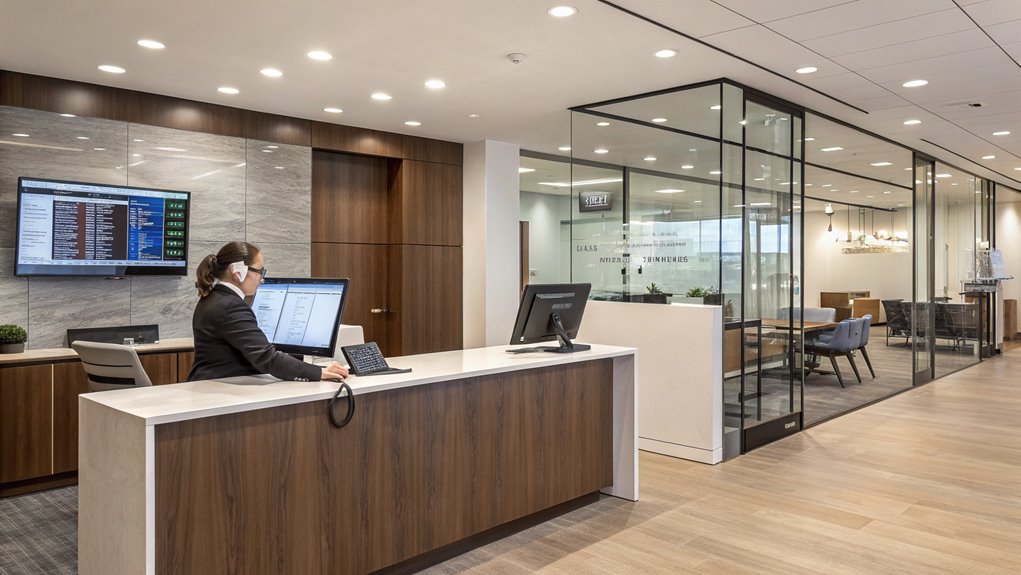Law firms face rising client demands for instant, accurate responses while managing limited staff and strict ethical rules—making traditional answering services less effective. Missed leads, delayed conflict checks, and mishandled urgent inquiries can quickly erode trust and revenue.
Modern AI-powered answering platforms fill these gaps by automating intake, transcribing in real time, and maintaining compliance-ready audit trails. This guide will show how to evaluate and implement AI-first solutions that integrate with tools like Clio and MyCase, enabling automated lead qualification, conflict screening, multilingual support, and seamless scheduling.
You’ll also learn how intent classification and unified voice/chat/SMS workflows prioritize emergencies, reduce follow-up friction, and boost conversion—helping firms scale client service without compromising ethics or efficiency.
AI-Powered Call Management and Automated Client Intake Systems
Our teams often rely on proven industry standards such as ATSI Gold Certification to demonstrate preparedness and best practices.
Modern law firms deploy AI-powered call management to capture every inquiry with 24/7 virtual reception, real-time transcription, and automated appointment scheduling that preserves professionalism and response speed. These CRM/CMS Integrations enable automated transfer of new client data into firm systems. Over time, these systems reduce missed opportunities and streamline workflows by screening calls, capturing intake fields, and prioritizing matters by urgency and practice area. Firms report higher lead conversion and faster case openings when intake is automated and integrated with CRM, calendaring, and matter-management platforms.
Advanced platforms emphasize privacy and compliance with encrypted communications, secure storage, and audit trails to protect privileged client data and meet ethical duties. Many vendors also offer bilingual intake specialists to expand client reach while maintaining confidentiality. Generative AI augmentation — including intent detection, natural-language summaries, and lead-scoring enables staff to focus on strategy and client care instead of repetitive admin tasks, improving both client experience and firm economics.
Core capabilities that matter for law firms:
- 24/7 virtual receptionist with contextual call screening and intelligent triage
- Real-time speech-to-text plus NL summaries for faster attorney review and matter capture
- Automated appointment booking and calendar sync with conflict checks and reminders
- Secure, encrypted intake workflows, retention policies, and chain-of-custody logs for compliance
- Lead qualification and scoring using intent analysis and firm-specific intake rules
- CRM/matter-management integrations, webhook support, and scalable API endpoints
As a takeaway, view AI-first intake as both an operational upgrade and a client-experience differentiator that shifts time from process to counsel. Adopting a secure, integrated AI intake system reduces overhead, increases responsiveness, and supports measurable KPIs like conversion rate and time-to-engagement. Prioritize platforms with provenance, auditability, and clear vendor attestations so you can scale confidently while meeting ethical obligations.
Integration Capabilities With Legal CRM and Practice Management Software
Many answering services now function as full CRM integration partners to law firms, providing continuous data sync and intake support. These partnerships often include CRM platform connectivity that eliminates manual data entry and syncs key client fields.
Law firms benefit from direct integrations with platforms like Clio, Lawmatics, and MyCase that synchronize caller profiles, appointments, and matter updates in real time. This reduces administrative burden, prevents missed follow-ups, and enforces consistent client records across calendars, billing, and communications. Seamless connectivity supports secure data flows, API-driven automation, and compliance with privilege and confidentiality requirements.
Integration goes beyond simple contact transfer to enable automated lead qualification, conflict checks, and routing by practice area using CRM metadata and intake rules. Advanced setups use webhook triggers, OAuth-secured connections, and field mapping to push qualified leads and intake forms directly into matter intake workflows. Firms see faster first contact resolution and higher conversion when answering services feed contextual notes, call recordings, and disposition codes into case management.
Bolded integration features that power attorney workflows include:
- Real-time contact & matter synchronization to prevent duplicate clients and maintain authoritative records
- Automated conflict-checking using mapped client identifiers and conflict rules to reduce ethical risk
- Intelligent call routing and practice-area matching driven by tagged matters, custom fields, and intake rules
- Triggered follow-up sequences and automated messaging that convert initial calls into scheduled consultations
- Analytics and reporting exports that tie call outcomes to firm KPIs, intake velocity, and revenue attribution
Firms that treat answering services as extensions of their practice management stack gain measurable operational leverage and improved client experience. This mindset shifts intake from manual triage to predictable, auditable workflows that scale with caseload.
Investing in API-first, secure integrations pays off in faster response, higher lead quality, and clearer compliance—start by mapping your critical fields, defining intake rules, and testing webhook flows to capture value immediately. Providers also ensure compliance with standards like HIPAA through encryption, audit trails, and user permissions.
Multi-Channel Communication Platforms: Voice, Chat, and SMS Solutions
Law firms that adopt AI-driven communication platforms consolidate voice, chat, SMS, and client portal interactions into a single, auditable record that improves response times and compliance. This unified approach reduces missed messages, accelerates intake workflows, and creates consistent client experiences across mobile, web, and legacy phone systems. Integrating contextual routing, natural language understanding, and secure message logging matters for both client satisfaction and risk management. Combining these capabilities supports intake automation, appointment scheduling, and prioritized case alerts without sacrificing attorney oversight. Additionally, firms can rely on 24/7/365 availability for mass tort campaigns to ensure leads are captured any time.
Embedding AI chat agents and SMS automation lets firms handle higher volumes of inquiries while escalating nuanced matters to attorneys using intent detection and sentiment analysis. Post-retainer services like 24/7/365 review solicitation and dedicated case communication teams can be integrated to maintain client engagement after intake. Firms can preserve the personal touch lawyers provide by surfacing relevant case history, conflict checks, and preferred contact methods during handoffs. Over time, this reduces client churn, shortens engagement cycles, and enables data-driven decisions about staffing and client outreach. That’s why firms that think AI-first achieve better conversion, higher retention, and clearer audit trails.
Core capabilities to evaluate when choosing a platform:
- Unified conversation history across voice, chat, SMS, email, and client portals for accurate context retention
- AI triage and intent classification to route leads, prioritize urgent matters, and automate routine responses
- Secure, tamper-evident logging and role-based access to support compliance and ethical obligations
- SMS and automated reminders integrated with calendaring to reduce no-shows and improve client adherence
- Real-time notifications and escalation workflows to ensure time-sensitive issues reach the right attorney quickly
Adopting an AI-first multi-channel communication strategy shifts firms from reactive to proactive client engagement, improving operational efficiency and perceived professionalism. It aligns technology with the emotional need for timely, trusted legal guidance and strengthens conversion at every touchpoint. As a next step, audit your current contact paths, map high-value use cases (intake, updates, reminders), and pilot a platform that demonstrates secure AI routing and measurable business metrics.
24/7 Availability and Bilingual Support for Enhanced Client Experience
Law firms operating across time zones need continuous coverage that treats every inquiry as a potential case, not just a voicemail. Integrating automated triage, live bilingual agents, and cultural fluency reduces lead leakage and increases conversion velocity for intake teams. That’s why firms that prioritize real-time client access and language localization see measurable improvements in retention, referrals, and firm reputation. This approach supports intake compliance, conflict avoidance, and timely escalation for emergencies. These services often include live chat and text options to capture leads across channels.
An AI-first answering strategy leverages intent classification, confidence scoring, and contextual routing to ensure urgent matters reach the right attorney immediately. Implementing HIPAA compliant processes ensures sensitive intake data is secured throughout the AI workflow. In practice, combining human bilingual specialists with machine translation and NLP-driven summaries creates a resilient intake pipeline that preserves nuance and legal accuracy. This hybrid model lowers operational costs while improving client satisfaction and legal outcomes.
Law firms can deploy 24/7 People-Powered Live Chat to ensure immediate human responses in English and Spanish outside normal business hours.
Core capabilities that drive results:
- 24/7 AI-enabled triage that distinguishes emergencies, schedules callbacks, and logs intake with metadata for downstream case management
- Bilingual agents trained in legal terminology (English/Spanish) plus on-demand multilingual translation for broader language support
- Real-time transcription and NLP summarization that generate actionable intake notes, tags, and urgency flags for attorneys
- Cultural competency training and persona-based scripts that increase engagement and reduce miscommunication across demographics
- Integration with PMS/CRM and secure messaging to automate follow-ups, compliance audits, and SLA reporting
Adopting an AI-centric, multilingual answering model shifts firms from reactive to proactive intake management, preserving opportunities and client trust. This mindset aligns operational processes with client expectations for immediacy, clarity, and cultural respect. Over time, those firms will convert more inquiries into retained matters and build measurable competitive advantage. Take the next step by evaluating your intake SLAs, language coverage gaps, and AI integration roadmap to safeguard every potential case.
Cost Analysis and ROI Considerations for Legal Answering Service Technology
Law firms evaluating answering technology should weigh long-term cost structure and operational impact, not just headline monthly fees. Over time, scalable pricing models, per-minute elimination, and automation reduce marginal cost per lead and support predictable cash flow forecasting. That’s why financial due diligence must include setup fees, volume sensitivity, and integration costs with practice management, intake workflows, and compliance checks.
AI-powered solutions deliver flat-rate, usage-agnostic pricing and consistent quality controls across channels like phone, SMS, and web chat. More importantly, firms benefit from data capture, reporting, and analytics that inform staffing, marketing ROI, and client satisfaction strategies—turning answering tech into a measurable business asset.
Key financial and operational trade-offs to evaluate:
- Pricing Model Comparison: Flat-rate vs. per-minute and tiered plans to project scalability impact
- Total Cost of Ownership: Setup, integrations, training, and hidden fees that affect ROI timelines
- Performance Metrics: Response time, accuracy, compliance, and conversion rates tied to revenue per lead
- Operational Leverage: Reduced staffing variability, predictable labor replacement, and hours reclaimed for billable work
- Data & Analytics Value: Reporting, call transcription, and intent signals that improve marketing attribution and intake efficiency
Adopting an AI-first answering service shifts decision-making from variable labor costs to predictable platform investment, enabling strategic reinvestment in growth initiatives. As a result, firms that pilot AI solutions can quantify savings, validate quality through controlled A/B tests, and scale without exponential cost increases. The next step is a short proof-of-concept: measure cost per qualified lead, compliance adherence, and client satisfaction to confirm that the technology delivers both financial and professional outcomes. Contact inquiries during business hours receive a same-day response.
Security Standards and Compliance Requirements for Legal Communications
Quick Take: Modern legal answering services must combine rigorous privacy controls, verified personnel, and advanced encryption to protect privilege while enabling efficient client communication and regulatory compliance.
Law firms choosing communication technology should demand demonstrable privacy controls, personnel vetting, and granular access logs to protect attorney-client privilege and meet regulatory standards. Integrating these protections with workflow tools—case management, secure messaging, and audit trails—reduces friction and preserves evidentiary integrity. In practice, this approach protects sensitive exchanges across phone, voicemail, SMS, email, and client portals without slowing client intake or matter triage. It reassures clients and regulators that the firm treats confidentiality as a measurable operational competency.
Service providers must be evaluated on both technical controls and human safeguards, including background screening, targeted legal-ethics training, and strict confidentiality covenants tied to enforceable penalties. Firms should verify encryption at rest and in transit, key management policies, and zero-trust access models to prevent lateral breaches. Continuous monitoring and automated compliance reporting (SIEM, CASB, log aggregation) provide evidence for audits and incident response playbooks. More importantly, aligning vendor SLAs with ethical duties closes the gap between marketing claims and courtroom or bar-examination scrutiny.
Core vetting and technical safeguards to require from providers:
- Background checks and role-based ethics training for all call handlers and admins
- End-to-end encryption (TLS+AES) and robust key-management procedures
- Multi-factor authentication and least-privilege account controls for access governance
- HIPAA-compliant architectures, BAAs where PHI is involved, and data residency options
- Regular third-party penetration tests, SOC 2/ISO 27001 reports, and continuous security monitoring
- Comprehensive confidentiality agreements, incident notification SLAs, and audit-ready logs
Prioritize measurable, auditable safeguards that map directly to ethical obligations and business risk so your firm can prove compliance under scrutiny. A vendor scorecard—covering personnel, cryptography, monitoring, and contractual protections—becomes a decision-making tool rather than a checklist. This mindset reduces exposure, preserves client trust, and makes security a competitive service differentiator. Move forward by demanding specific evidence (reports, demos, contract language) before onboarding any communications provider.
Conclusion
As law firms adopt AI-driven answering services, they convert reactive call handling into proactive client engagement strategies. Integrating conversational AI, secure case routing, and multi-channel messaging reduces response time while preserving attorney oversight and ethical compliance. Practical deployment focuses on workflow alignment, staff training, and measurable outcomes that support client retention and referral generation.
When firms prioritize seamless integrations with practice management systems and encrypted communication channels, intake accuracy improves and client trust deepens. Actionable reporting and customizable triage let teams scale without sacrificing personalized service, positioning the firm to meet modern expectations efficiently. For expertise in designing compliant, high-performing answering solutions, consider Alert Communications and their law firm answering service solutions.
Recent Posts
Sidebar
Request Service
Sidebar
Recent Posts
Get a quote
Let our 24/7 Answering Service Help Grow Your Firm
Landing Request Service
Landing Request Service

How We Guide You Every Step of the Way
- We handle your incoming calls and leads
- We follow up, quickly
- We process all information and hand it to you
- We manage scheduling efficiently
- Report, Analyze, Improve





